EU-ASE at COP23
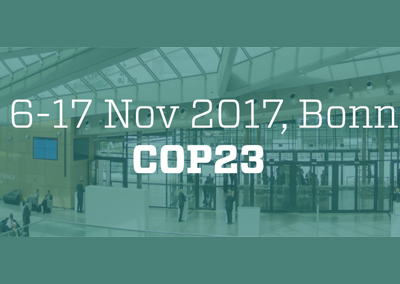

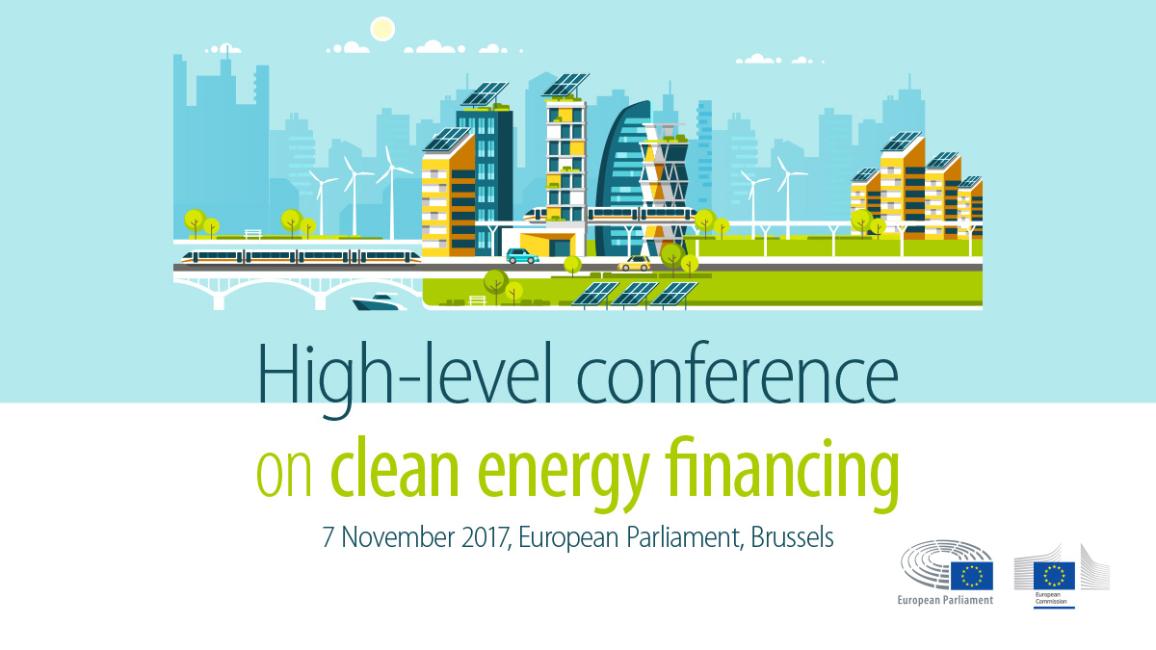
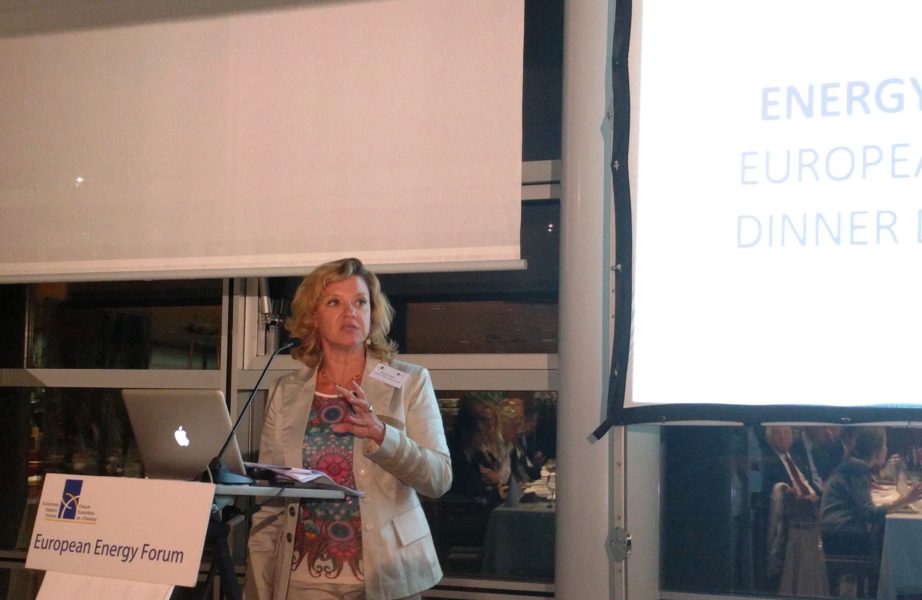
Debates on the proposal for a revised Energy Efficiency Directive have mainly focused on setting the right level of ambition through targets. The European chemical industry presented its views to shift the focus of the discussion towards the means and concrete proposals on how those targets can be achieved.
The chemical industry is known as one of the largest energy consumers in Europe. It also delivers energy efficient solutions across the European value chains, especially in the construction sector and it can play an important role in helping achieve European targets and at the same time unlock the full potential of energy efficiency to the benefit of the European economy.
During the debate, organized by the European Energy Forum, Marco Mensink, Cefic Director General, presented the vision of the chemical industry and Monica Frassoni, President of the European Alliance to Save Energy (EU-ASE), presented the views of the the business represented by EU-ASE. Ms Frassoni acknowledged the energy saving potential in the building sector as well as the need of ambitious targets to provide the business community with the necessary regulatory long term framework to attract investments i the European Union and boost the energy efficiency market.
Enel and EU-ASE welcome the revision of the Directives on Energy Efficiency and Energy Performance of Buildings proposed within the Clean Energy for All Europeans package in view of setting an EU long-term framework for improving energy efficiency investments: key drivers of the low carbon economy transition. Buildings and transports offer a huge potential for efficiency gains: in-depth evaluation1 of the aggregated savings potentials in different sectors found that buildings and transport have the highest share for cost-effective energy savings, respectively 61% and 41%, followed by the tertiary sector (38%) and industry (26%).
In addition, in 2015 the International Energy Agency (IEA) estimated that, in Europe, approximately 70% of emissions cuts to stay below 2°C will need to come from energy efficiency which was described by the IEA itself as an energy source in its own right.
There is no technology gap and energy efficiency is a business opportunity not only for solution providers. Also the power sector, which has already come a long way in its transformation towards decarbonization, can be the key driver for further driving energy savings in these end-use sectors.
Enel and EU-ASE believe that an effective EU policy framework on energy efficiency should ensure predictability and security for investments, consistency, flexibility and market-driven cost-effectiveness, with a specific focus on the urban context where the majority of the population lives and significant co-benefits arise as improvement of air quality and minimization of related health risks.
Exploiting the synergies between the building and transport sectors and the electricity system means integrating efficient technologies and services through the smart grids, towards the development of smart cities.
BUILDINGS
Citizens spend 90% of their lives inside buildings which currently account for 40% of EU primary energy demand and represent 36% of CO2 emissions. 9 out of every 10 of the existing buildings in the EU will still be standing and occupied by 2050 and 75% of them were constructed with low (or no) energy efficiency requirements. This is why existing buildings should be put at the center of the EU’s energy efficiency strategy by setting a reliable and coherent EU framework for the definition of national long-term renovation strategies for the entire building stock.
A reduction of energy consumption through energy efficiency measures must be prioritized to firmly apply the “Efficiency First” principle in building renovation, while boosting their integration as active players in the modern energy system.
Renovation strategies should be developed within each specific national energy transition context by planning in terms of districts and entire energy systems, rather than focusing only on individual buildings to reap the full potential of high-efficiency energy supply solutions and maximize the energy saving potential of the entire energy chain.
Digitalization will play a key role in managing and integrating renewable and distributed generation, while reducing energy consumption and empowering end-users towards energy efficient behaviours. Such market changes will be accelerated by the increasing ‘smart readiness’ of buildings able to respond to market signals through demand response. As a result, the role and value of transmission and distribution networks and infrastructure will surge. The change is not only technological but also cultural: operators, but also regulators will need to quickly evolve to meet the new challenges.
TRANSPORT
Urban mobility accounts for 40% of all CO2 emissions of road transport. Electric vehicles (EV) are the solution to decarbonize transport, improve air quality and enhance energy efficiency as the efficiency of electric motors (80-90%) is much higher than the one of combustion engines (20-30%).
However, it is essential to stimulate their EU market penetration by removing the economic and non-economic barriers currently hindering a quicker uptake.
Smart grids play a crucial role within the EU’s decarbonisation process by supporting the development of e-mobility as well as a structural role in smart cities offering part of the infrastructure needed for the activation of new approaches of thinking and acting within urban ecosystem. On the demand side, smart grids and smart meters enable consumers to actively manage their own energy demand and put in place energy efficient behaviors. Demand side services provided by EV batteries and smart charging solutions can be a key catalyst for consumer’s empowerment, so important to drive energy savings.
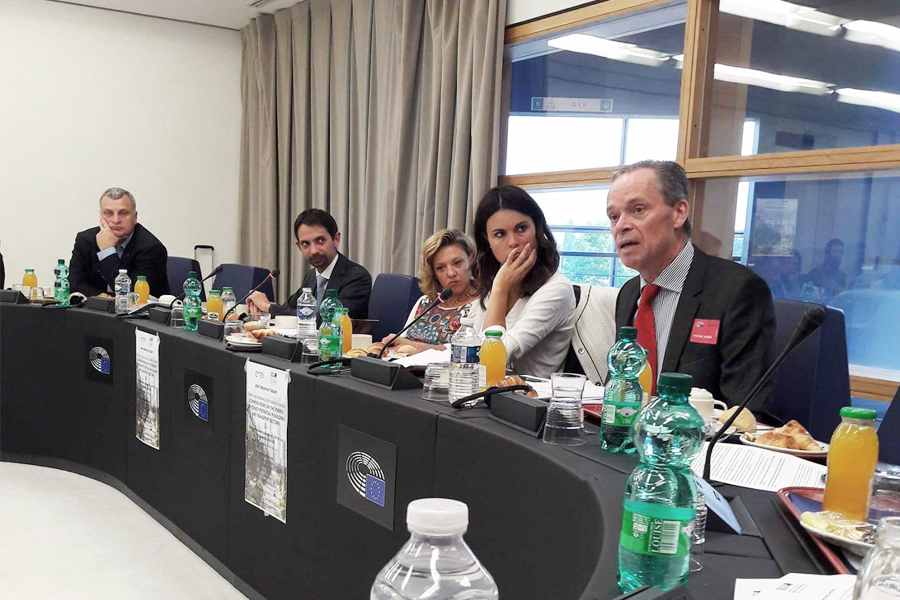
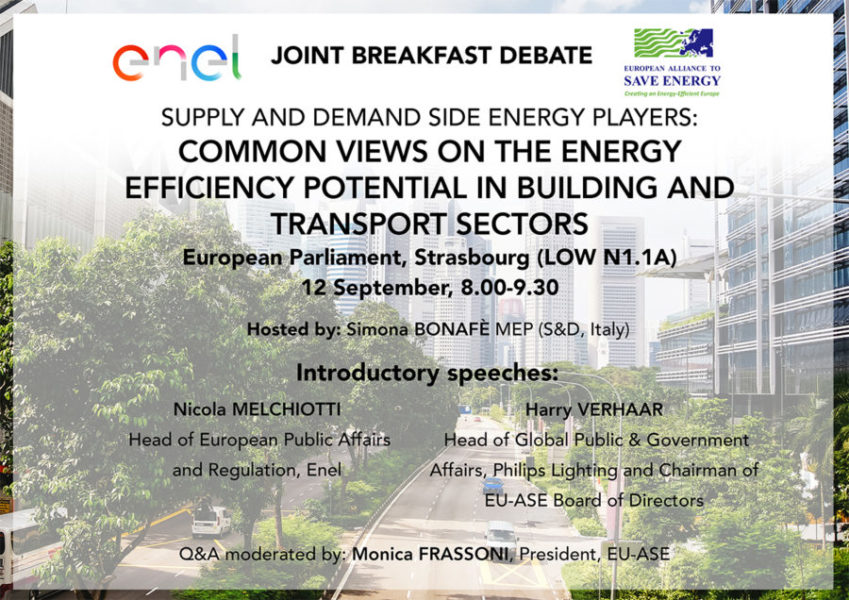
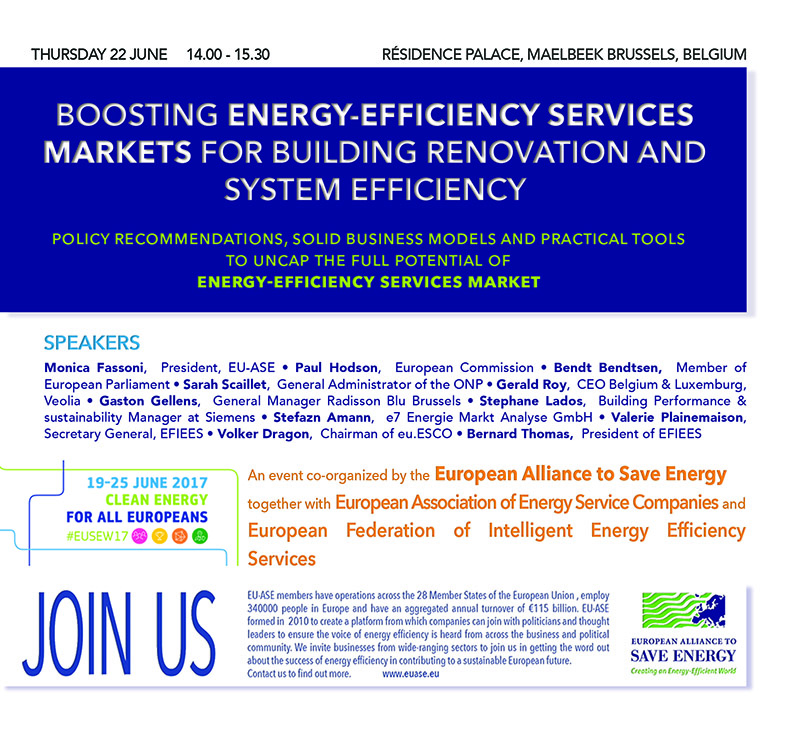
The event promoted policy recommendations, solid business models and practical tools to uncap the full potential of energy-efficiency services market.
High-level speakers from the EU and international institutions discussed the legislative framework and market conditions for energy-efficiency services, including the current situation and policy outlook for the 2020 & 2030 horizons and beyond.
In particular, the event highlighted the cost-effective contribution of the current provision for the promotion of energy-efficiency services in art. 18 of the Energy Efficiency Directive to the achievement of the national ‘long-term renovation strategies’ proposed in art. 2a of the revised Energy Performance of Buildings Directive.
During the event, a number of practical examples were presented, showing how energy efficiency service solutions, such as energy performance contracts, can be successfully deployed in order to deliver a high degree of energy savings along with further results in terms of innovation and cost-efficiency. The presentations were given on a peer-to-peer basis by the clients and providers involved in the projects displayed.
The event was followed by the presentation of two practical tools for boosting the energy-efficiency services market elaborated within EU-funded projects: the European Code of Conduct for Energy Performance Contracting (EPC) and Quality Criteria for EPC.
The European Code of Conduct for EPC, established as part of the Transparense project in 2014, defines the basic values and principles that are considered fundamental for the successful preparation and implementation of EPC projects. It was developed in tight collaboration between actors of the European EPC sector: providers, clients and European associations representing energy services companies (ESCOs). Since it was released, it has been a reference document in the field of EPC and the number of its signatories still keeps growing.
Quality Criteria (technical and financial) for EPC are a new tool that will be developed within the QualitEE project, starting in mid-2017 under the H2020 programme. QualitEE aims at scaling up investment in energy-efficiency services by reducing complexity of such services and increasing the trust of clients and financial institutions in energy-efficiency service providers. Technical and financial Quality Criteria will therefore be developed to bring more clarity in Energy Performance Contracts, facilitating certification of energy efficiency services, thus fostering investment in this sector. QualitEE is going to complement the Energy Efficiency Financial Institutions Working Group (EEFIG) held by the European Commission.
The closing remarks by market practitioners provided another brief overview of the role of EPCs, their potential and existing barriers to their further development, as well as possible ways and ideas to tackle them.
The event brought together the main actors of energy-efficiency service market: policy makers; providers of energy-efficiency services (ESCOs), public and private clients: municipalities, industrial, commercial and residential sectors; technology providers, financial institutions, academia and other relevant actors interested in boosting the market.